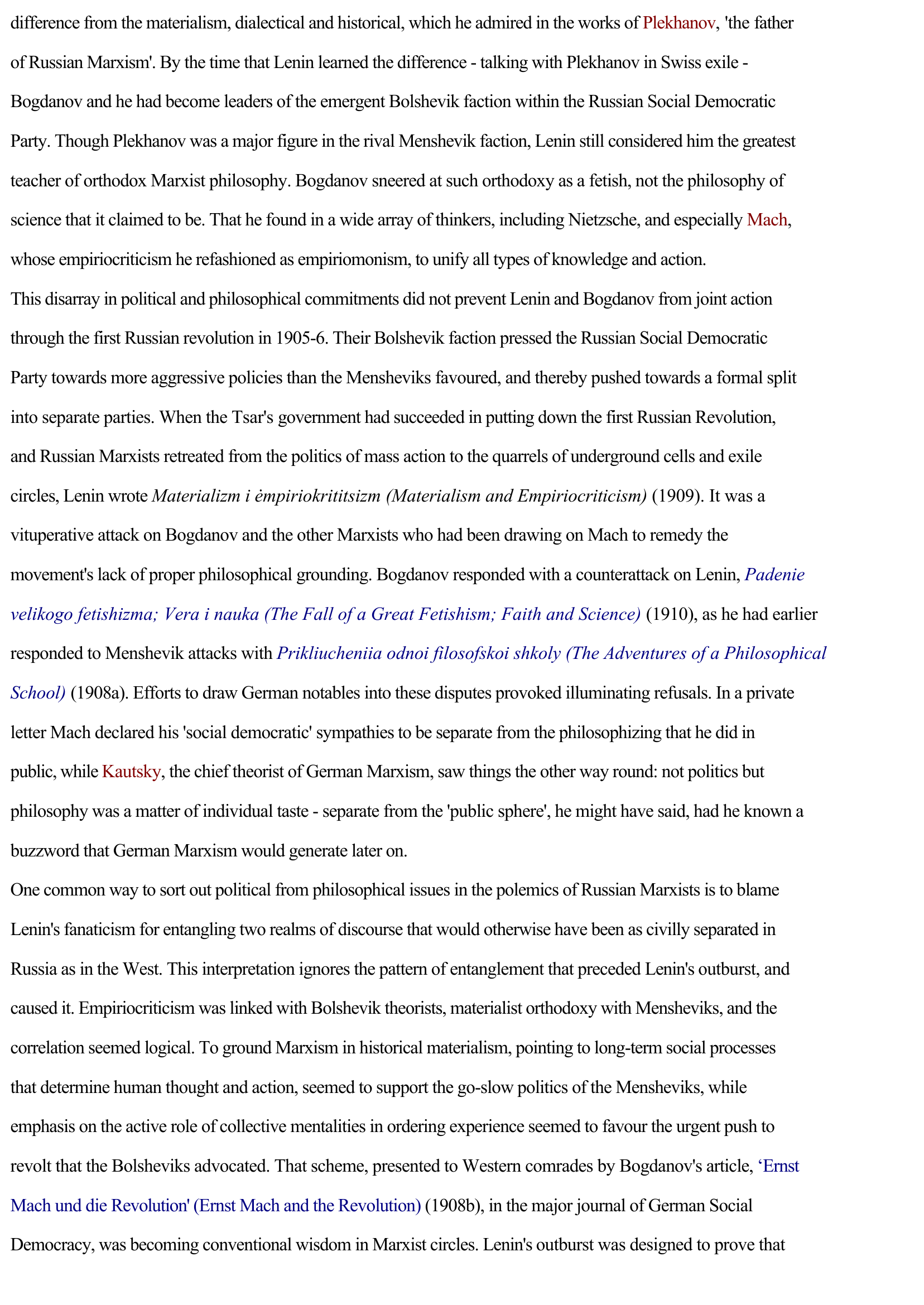Bogdanov, Aleksandr Aleksandrovich
Publié le 22/02/2012

Extrait du document
«
difference from the materialism, dialectical and historical, which he admired in the works of Plekhanov , 'the father
of Russian Marxism' .
By the time that Lenin learned the difference - talking with Plekhanov in Swiss exile -
Bogdanov and he had become leaders of the emergent Bolshevik faction within the Russian Social Democratic
Party.
Though Plekhanov was a major figure in the rival Menshevik faction, Lenin still considered him the greatest
teacher of orthodox Marxist philosophy.
Bogdanov sneered at such orthodoxy as a fetish, not the philosophy of
science that it claimed to be.
That he found in a wide array of thinkers, including Nietzsche, and especially Mach ,
whose empiriocriticism he refashioned as empiriomonism, to unify all types of knowledge and action.
This disarray in political and philosophical commitments did not prevent Lenin and Bogdanov from joint action
through the first Russian revolution in 1905-6.
Their Bolshevik faction pressed the Russian Social Democratic
Party towards more aggressive policies than the Mensheviks favoured, and thereby pushed towards a formal split
into separate parties.
When the Tsar's government had succeeded in putting down the first Russian Revolution,
and Russian Marxists retreated from the politics of mass action to the quarrels of underground cells and exile
circles, Lenin wrote Materializm i ėmpiriokrititsizm (Materialism and Empiriocriticism) (1909).
It was a
vituperative attack on Bogdanov and the other Marxists who had been drawing on Mach to remedy the
movement's lack of proper philosophical grounding.
Bogdanov responded with a counterattack on Lenin, Padenie
velikogo fetishizma; Vera i nauka (The Fall of a Great Fetishism; Faith and Science) (1910), as he had earlier
responded to Menshevik attacks with Prikliucheniia odnoi filosofskoi shkoly (The Adventures of a Philosophical
School) (1908a).
Efforts to draw German notables into these disputes provoked illuminating refusals.
In a private
letter Mach declared his 'social democratic' sympathies to be separate from the philosophizing that he did in
public, while Kautsky , the chief theorist of German Marxism, saw things the other way round: not politics but
philosophy was a matter of individual taste - separate from the 'public sphere' , he might have said, had he known a
buzzword that German Marxism would generate later on.
One common way to sort out political from philosophical issues in the polemics of Russian Marxists is to blame
Lenin's fanaticism for entangling two realms of discourse that would otherwise have been as civilly separated in
Russia as in the West.
This interpretation ignores the pattern of entanglement that preceded Lenin's outburst, and
caused it.
Empiriocriticism was linked with Bolshevik theorists, materialist orthodoxy with Mensheviks, and the
correlation seemed logical.
To ground Marxism in historical materialism, pointing to long-term social processes
that determine human thought and action, seemed to support the go-slow politics of the Mensheviks, while
emphasis on the active role of collective mentalities in ordering experience seemed to favour the urgent push to
revolt that the Bolsheviks advocated.
That scheme, presented to Western comrades by Bogdanov's article, ‘Ernst
Mach und die Revolution' (Ernst Mach and the Revolution) (1908b), in the major journal of German Social
Democracy, was becoming conventional wisdom in Marxist circles.
Lenin's outburst was designed to prove that.
»
↓↓↓ APERÇU DU DOCUMENT ↓↓↓
Liens utiles
- Rodtchenko, Aleksandr - photographes et photographie.
- Tvardovski Aleksandr Trifonovitch, 1910-1971, né à Zagorie, écrivain soviétique.
- Souvorov (Aleksandr Vassilievitch, comte, puis prince), 1729-1800, né à Moscou, général russe.
- Soljenitsyne Aleksandr Issaïevitch , né en 1918 à Kislovodsk, écrivain russe.
- Scriabine ou Skriabine Aleksandr Nikolaïevitch, 1872-1915, né à Moscou, pianiste et compositeur russe.

































